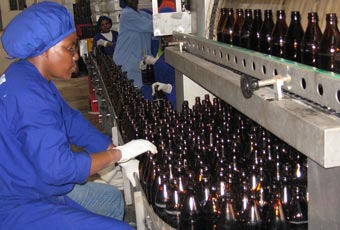
By Independent Team and Agencies
But Nigerian competitors say cassava, sorghum beers will fail
SABMiller (SAB.L), the parent company of Uganda’s Nile Breweries in Jinja is embarking on a strategy to make beer more affordable.
According to a report in the Business Week in the UK, the strategy targets low-income consumers who have traditionally made home-brewed hooch from local ingredients that range from bananas and watermelons to root vegetables.
‘It is an entirely logical move, given that a large segment of the population in Africa may not be able to afford commercially brewed beers as often as they’d like,’ says Kim Slater, director of consulting at beverage market research firm Canadean in Basingstoke, Britain.
The company plans to more affordable brews using locally sourced ingredients such as cassava-a root vegetable that yields a rich starch-in place of more expensive imported ingredients.
By June, SABMiller hopes to launch a commercial trial in Angola of a new formulation of its N’Gola brand, using locally grown cassava instead of imported maize. The beer will retail for approximately 40% less than other mainstream lagers.
Although cassava is widely grown in Africa, it’s produced today primarily by subsistence farmers. By developing a local supply chain, SABMiller hopes to help Africans move into cash-crop farming. Within two to three years, van den Houten says, the company is aiming to develop an entirely new beer using 100% cassava or other locally grown ingredients such as palm derivatives.
SABMiller in 2002 launched Eagle, a sorghum beer that’s now the company’s second-largest African brand. Using local ingredients also qualifies SAB for tax breaks, which in turn helps it sell Eagle for one-third less than lagers made from imported barley.
SABMiller hopes the new beers will be commercially brewed beer at 50 percent to 60 percent of the cost of standard lager by using locally sourced ingredients.
In Nigeria, SABMiller’s cheap beer is causing a stir although Nigerian Breweries (NB) plc, the country’s top brewer and Guinness Nigeria plc, the No.2 are putting on a brave face.
Reports from there indicate that the duo has refused to follow SABMiller down-market and stuck to their premium brands.
Since setting up shop in Nigeria recently, SABMiller has mobilised farmers to grow cassava and barley for the new discount beers.
SABMillers is anxious to tap into beer market which they estimate to be worth US$ 3 billion (Shs 6000 billion) annually. SABMiller’s competitors say Nigeria will not take to the cheap beers.
NB’s boss Michiel Herkemij is quoted to have said: ‘I do not know many Nigerians who like cheap things. I think what they are trying to do is to copy their strategy for Eastern Africa which is clearly a strategy that works for that part of the world. This home brew beer is a huge business. They tried it there with a locally produced sorghum. The sorghum they have in East Africa is different from the one we have here. So if they are planning to produce cheap beer with that, I do not see Nigerians going for cheap beer. The sorghum we have here is totally different from the one we have in East Africa. It doesn’t allow itself to be brought down, to be stepped down to the level you are talking about.
SABMiller’s position as one of the world’s biggest brewers improved on its strong growth in China and its purchase of Dutch beer Grolsch.
Globally, it competes at that level with Heineken and the US’s Budweiser brewer, Anheuser-Busch, according to figures from UK-based researchers Plato Logic in early 2008.
The Business Week report, however, quoted Trevor Stirling, a research analyst for European beverages at Sanford C. Bernstein (AB) in London, saying the four main international brewers currently control nearly 90% of the African market: SABMiller has a 43% share vs. 19% for Heineken (HEIN.AS), 16% for French brewer Castel Group (in which SABMiller owns a 20% stake), and 12% for Diageo.
Stirling said a move toward local sourcing is on each company’s agenda. In Africa, SABMiller operates in 14 countries with about 45 indigenous African brands, ranging from the more affordable Chibuku Shake Shake in Malawi and Eagle, Senator and Serena in Uganda, Tanzania, and Zimbabwe to such premium brands as Nile Special and Mosi
SABMiller, which was known as South African Breweries prior to its 2002 acquisition of Milwaukee-based Miller, gets up to 35 percent of its overall profits from its Africa operations, compared with just 4% for its main African rival Diageo (DEO).
Hoping to tap into the informal market, SABMiller is embarking on a new strategy to make beer more affordable. The largest brewer on the African continent, with operations in 14 countries, SABMiller already has around 45 indigenous African brands, ranging from the more affordable Chibuku Shake Shake in Malawi and Eagle in Uganda, Tanzania, and Zimbabwe to such premium brands as Nile Special and Mosi.
Targeting low-income consumers in emerging markets was perfected by Anglo-Dutch consumer goods giant Unilever with its inexpensive individual sachets of everything from shampoo to detergent. Nestlé, Nokia, and Philips followed suit with products and services tailored to emerging-market consumers. Some of those innovations are now also starting to ‘trickle up’ to more developed economies.
According to the latest figures released by London-based market research firm Plato Logic, global beer sales grew by less than 2% in 2008, down from 5.7% in 2007. Volume growth is expected to continue its decline this year.
SAB’s success with sorghum in Africa formed the template for a similar programme launched in India in 2005 to grow barley. The company currently works with an estimated 6,000 small-scale Indian farmers who receive prices that average 5% higher than the market rate to produce an estimated 20% of the barley the brewer uses in India. SABMiller figures it will need roughly 55,000 farmers in its supply chain across India and Africa by 2011 to meet future production needs.
The company also is looking at growing barley in African countries such as Angola, Ethiopia, Mozambique, and Zambia. It’s already working with local farmers in Tanzania using a ‘hub and spoke’ model, where one larger commercial farm supplies around 40% of the barley and trains smaller growers in the surrounding area to supply the rest.
The Business Week story says to bring down costs further, SABMiller must also address the price of packaging-whether bottles, cans, or kegs-which van den Houten says can account for up to 60% of overall production cost. The company is looking at everything from using less labelling to trying out materials such as cardboard or collapsible plastic containers.
 The Independent Uganda: You get the Truth we Pay the Price
The Independent Uganda: You get the Truth we Pay the Price


